A leaked video exemplifies what Black migrants endure in US detention centers

A leaked video obtained by Insider shows guards violently tackling a Black asylum seeker at a Louisiana detention center.
Detainees and immigration lawyers say there is a disturbing and overlooked problem of anti-Black racism in immigration detention.
The criminalization of immigration has meant that migrants and asylum seekers are placed in a system with a long history of mistreatment.
In the fall of 2020, Brandon was playing the FIFA 2020 video game in the rec room of the LaSalle Correctional Center in Louisiana, where he had been locked up for five months.
A Salvadoran man, watching the action over Brandon's shoulder, started joking around, covering Brandon's eyes and distracting him from the game. "It was annoying," said Brandon, an asylum seeker from Cameroon. He lifted up his hand to mock punch the Salvadoran. The horseplay never escalated into anything serious, and, after a little while, the Salvadoran left Brandon alone and he finished his game. He lost, 2–1.
What neither of them realized was that the mock punch had been caught on LaSalle's video monitors. A few minutes later, guards entered the rec room and approached Brandon. They told him he was being transferred to a new dorm – which meant away from fellow Cameroonians and the other Africans he had befriended. Brandon asked to stay where he was. Being with other Cameroonians was a lifeline for him in detention. "I felt like family with them," he said. Calmly, he continued trying to explain himself. "I never even raised my voice," he said.
In a video obtained by Insider, Brandon is seen walking down a hallway and being followed by three guards. As he approaches the camera, one of the guards grabs him by the shoulder and pushes him against the wall. In the next few seconds, they ram his head into the wall, put him in a chokehold, spin him around, throw him to the floor, and pin him down. One of the guards briefly puts his knee on Brandon's neck. With the guards dog-piled on top of him, he felt like he was fighting to survive: "I was struggling to breathe. I couldn't move. I was feeling so weak."
Six guards from the LaSalle Detention Center, which is privately run by LaSalle Corrections, kept Brandon pinned to the floor as one of them slapped handcuffs on him. They then yanked him to his feet and pushed him back against the wall. "Why are you treating me like I'm not a human being?" Brandon recalled asking them.
After the guards tackled him, Brandon was thrown into a solitary confinement cell, where he remained for three days.
Brandon suspected bias was at work when the guard shoved him against the wall. "He was doing it because I was Black and from Africa," Brandon said.
LaSalle Corrections did not respond to repeated requests for comment. ICE spokesperson Sarah Loicano also declined to discuss the specifics of Brandon's case but commented: "U.S. Immigration and Customs Enforcement (ICE) does not tolerate the mistreatment of anyone in the agency's custody and takes all allegations of abuse seriously," Loicano said. "Allegations of misconduct by ICE employees or contractors are reported to ICE's Office of Professional Responsibility (OPR) and are reviewed by the Department of Homeland Security (DHS) Office of the Inspector General (OIG)."
Months later, after two transfers, Brandon was finally released from detention and allowed to continue pressing his asylum case while out on bond.
When he opened his package of personal effects, he was surprised to find an unlabeled CD tucked in with the clothes he'd been wearing when he was first taken into custody. It took him a few weeks to find a player, but when he finally did he discovered it was a video of the guards tackling him. He has no idea who had slipped the CD into his things, or why.
Less food, longer stays in solitary
Brandon was born in Cameroon, a country in West Africa that, since 2016, has been locked in a bloody civil war between the ruling Francophone party and separatist Anglophones. The government's crackdown, including extrajudicial killings, has led to charges of genocide. At age 26, he fled the country after his mother was killed by government agents, and he was subsequently targeted. "They tried to extinguish my life," he said. "But I never participated in anything like politics."
In August of 2019, he crossed the US border at Brownsville, Texas, and told Customs and Border Patrol officials he was seeking asylum. He was promptly handcuffed and taken into custody. Soon thereafter, he was sent to Louisiana, the country's incarceration capital and, more recently, host to a vast network of immigrant detention facilities.
According to Brandon, the mistreatment of detained Black people at LaSalle went beyond physical violence. It was more pervasive, more quotidian, more constant than any explosion that could be caught on video. "Officers didn't attend to Black detainees," Brandon explained, trying to capture the extent of the discrimination. "They didn't give us the same privileges," he said. While he saw other detainees occasionally get a little extra food, one or two additional slices of bread, or new razors for shaving, Black detainees were rarely if ever on the receiving end of these gestures.
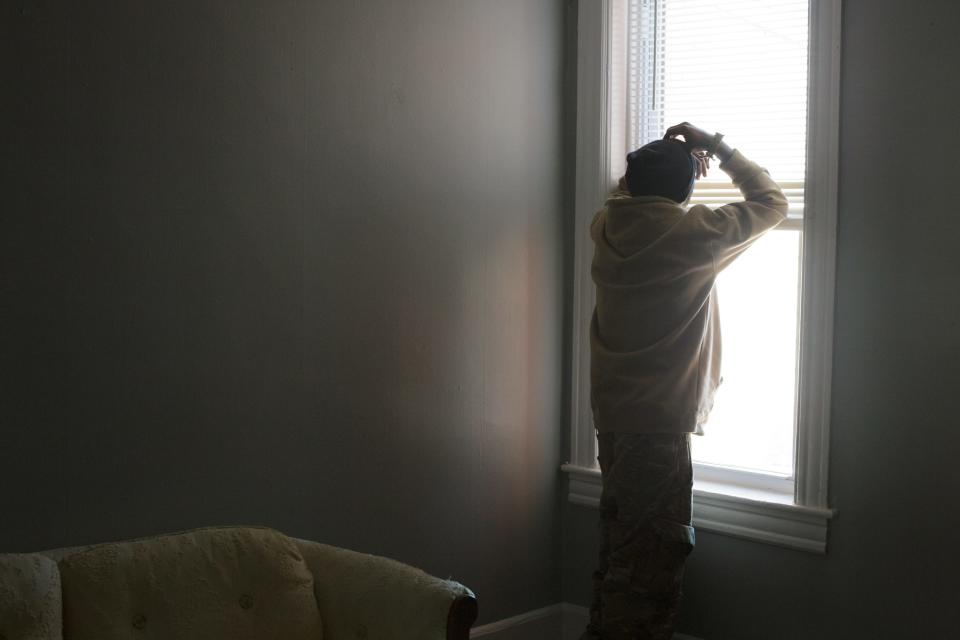
Brandon's story points to a larger problem. The increasing criminalization of immigration has meant that migrants and asylum seekers – men and women who have not been convicted of any crime – are placed in jails and prisons, sometimes for years. They're also subjected to punishing conditions like solitary confinement, medical neglect, unpaid labor, and the kind of excessive force by guards that prison reform advocates have long documented and decried.
For advocates, tracking the scope and severity of abuse in the immigration detention system can be daunting. Latinos are ensnared — and sometimes mistreated — at rates higher than any other demographic. But the U.S. immigration system levies particular violence against darker-skinned migrants, no matter their ethnicity. The numbers of migrants from Africa and the Caribbean showing up to or crossing the U.S.-Mexico border has been increasing in the last decade — leading to more detentions for Black migrants and, advocates claim, greater chances of abuses born out of bias. Detainees are frequently kept out of view by being locked up or swiftly deported, and their stories are rarely heard, or come filtered through NGO reports or official complaints to the government.
"The treatment of Black immigrants is normalized so much, to a point where departments and staff are numb to it," said Allen Morris, an attorney with Refugee and Immigrant Center for Education and Legal Services, or RAICES, an immigrant rights organization based in Texas. Morris said that he's heard of other Black migrants suffering similar racist abuse at LaSalle, where Brandon was detained, but this was the first time he'd seen it captured on video. ("This is just despicable," Morris said after viewing Brandon's video.)
A report published this year by Human Rights Watch documented 24 cases of abuse against 18 Cameroonian asylum seekers who were later deported, including "forced fingerprints on documents, pepper spray, painful restraints, and abusive solitary confinement, isolation, or segregation."
Current and former Black detainees, as well as advocates and researchers, have responded to the appalling detention conditions and alleged discriminatory treatment by filing official complaints about their mistreatment, as well as reaching out to the media and organizing and staging protests both within and outside of detention centers. Last month, yet another official complaint was filed alleging racist abuse of Black migrants — including frequent use of the N-word and claiming that "Africans have a certain kind of smell" — as well as generalized violence and medical neglect, in New York state. 56 of the detained migrants recently went on hunger strike in protest.
And still, the abuse continues.
In 2018, Freedom for Immigrants conducted the first national study on hate and bias in U.S. immigration detention centers and documented at least 800 complaints of abuse in 34 different jails and prisons based on race, ethnicity, or nationality. It included the examples of someone detained in southern Texas being called a "monkey" before being thrown into solitary confinement. At an ICE facility in New Jersey, according to a complaint from American Friends Service Committee, a sergeant locked a detained Black migrant in his cell, told him, "You're never going home" — then added, "White power." In another watchdog report, the Southern Poverty Law Center documented racial slurs and the use of pepper-spray at Florida's Glades County Detention Center.
"When it comes to us, the Africans, they have a problem with us," one of the abused detainees said.
A peer-reviewed study published in "Punishment and Society" found that Black immigrants were six times more likely than others in ICE detention to be sent to solitary confinement. The study further found that African and Caribbean immigrants represented "24 percent of all people subjected to solitary confinement," even though they made up just 4 percent of those in ICE detention. A report from Freedom for Immigrants looked at ankle shackling in a sample population, and found that 31 percent of those subjected to that treatment were Black even though they made up just 15 percent of the population of that sample.
Lawmakers are finally starting to take notice. In January, Representative Cori Bush (D-MO) and Senator Cory Booker (D-NJ) called for a "holistic review of the disparate treatment of Black migrants."
'Eat his dog food'
In autumn 2021, Insider sent an informal survey to immigration attorneys and advocates to ask about a wide range of discriminatory and abusive practices. We then spoke with more than two dozen attorneys, advocates, and currently or formerly detained migrants, all of whom described a pattern of widespread bias and discriminatory treatment of Black detainees in U.S. immigration detention centers.
Two attorneys echoed Brandon's complaint about not getting enough to eat, and reported that their clients were given insufficient food, or were placed at the back of the line to receive food, for no reason other than that they were Black. Other responses noted that Black detainees sometimes struggled to access basic supplies, such as soap, were subjected to solitary confinement at a high rate, and faced racist and abusive language by guards and other staff.
"In detention facilities where immigrants are held alongside individuals in criminal custody, Black immigrants are type-cast as being in criminal custody rather than ICE custody," said attorney Romelia Solano, co-founder of the immigrants' rights organization Mariposa Legal.
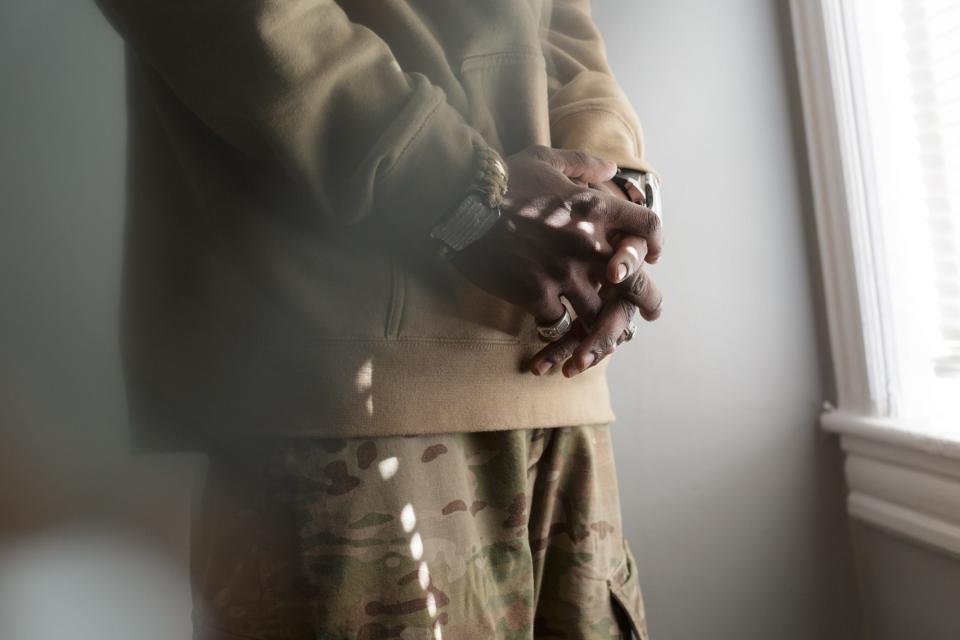
Solano said that one of her clients, a Black man held at a facility in Kentucky, told her that requests for cleaning supplies and other necessities needed to go through Latino or white inmates because his requests were ignored. That same client was not provided with a mattress and forced to sleep on the floor when the detention center was overcrowded, Solano said.
A guard in another detention center called a Black man a dog and told him to "eat his dog food."
Another detained Black man, according to his attorney's response to our survey, had a pepper ball thrown in his cell, wasn't allowed to follow his Rastafarian vegan diet, was repeatedly thrown in solitary confinement — once for complaining of a headache — and was regularly subjected to strip searches that kept occurring around visits from his attorney.
"After 7 years of practice, I can confidently say that the Black clients I have represented or whose representation I have supervised are consistently subjected to greater degrees of abuse and discrimination," his attorney said.
The incarceration capital of the world
No state better illustrates the criminalization of immigration detainees, and its collision with longstanding patterns of racism, than Louisiana. It's both the incarceration capital of the world and the solitary confinement capital of the world: 19 percent of prisoners in the state experience some form of solitary confinement, a rate that's four times higher than the national average.
It's also been at the forefront of the private prison industry. Across the state, eight new immigration detention centers have been opened in the past three years – all privately run. There are now 11 in total, including the LaSalle Correctional Center where Brandon was detained. Some of these detention centers are operating within state prisons or jails that also detain non-immigrants charged or convicted of crimes.
And some of these immigration-only facilities are run by the same staff that used to run the prisons — and the anti-Black bias remains, says ACLU attorney Eunice Cho, who co-authored "Justice Free Zones," an extensive report on conditions in immigration detention centers, "It's just a new phase of mass incarceration of Black folks, whether they are citizens or non-citizens," Cho said.
"It should not be surprising that Black people continue to suffer disproportionate consequences and treatment in U.S. immigrant detention facilities," said Sami Disu, an adjunct lecturer at the Department of Africana Studies at John Jay College of Criminal Justice. "The routine abuses of imprisoned Black peoples in the regular criminal justice system is extended to Black immigrants in U.S. detention facilities, whether in custody of CBP or stewards in private detention facilities."
While the flourishing of private prisons is often associated with the Trump administration, its history extends to prior administrations, and Biden has given for-profit companies a pass to detain migrants.
Just days into office, President Joe Biden signed an executive order to "eliminate the use of privately operated criminal detention facilities," which was welcome news to critics of mass-incarceration. Private prison companies, however, have found ways to circumvent the order and continue operations, and immigration facilities were exempt from the order. Most immigrants today are detained in facilities run by for-profit companies which largely follow the prison model of restrictive and punitive conditions.
Since the 2010s, immigration detention has increasingly come to rely on prisons and jails — the brick-and-mortar manifestations of a mass incarceration system that has notoriously and disproportionately targeted Black people. Even as states and the federal government dialed down the number of people held in for-profit prisons, ICE stepped in to contract out and fill recently emptied beds. In Louisiana, after prison reform measures in 2019 led to a drop of 9,000 fewer people in prisons, ICE obtained contracts to detain 6,000 more people in the state. In just Texas and Louisiana, 11 separate facilities in recent years have shifted from prisons or jails to immigration detention centers.
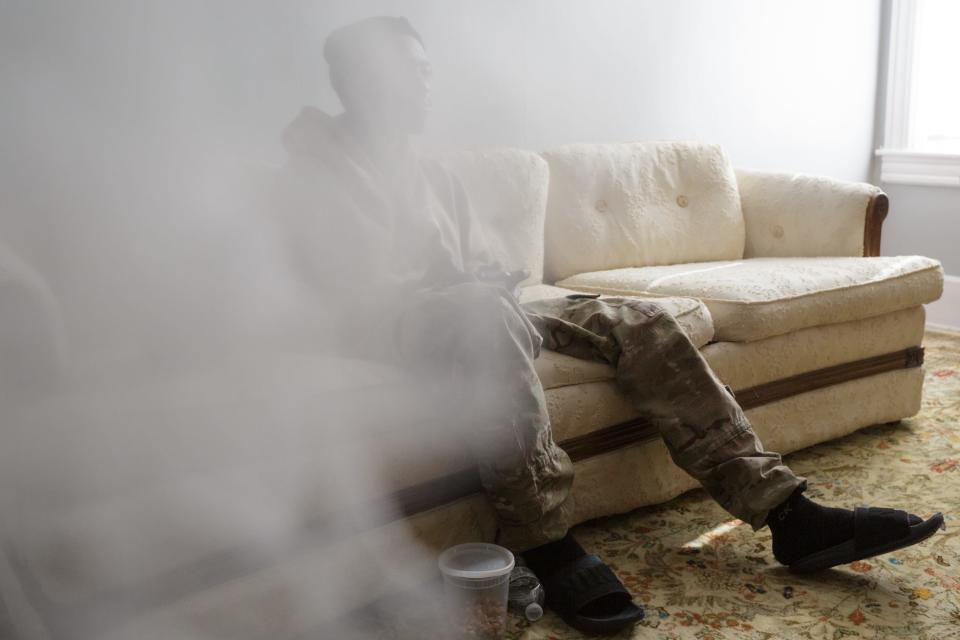
And while the Biden administration has promised to reform and humanize immigration policy, "for the most part they're continuing the detention agenda," said Silky Shah, the executive director of Detention Watch Network.
One Black immigrant who spent more than two years in a Louisiana jail and who asked not to be identified because of an ongoing immigration case and a history of retaliation against him, said guards pitted Black and Latino detainees against one another, frequently separating detainees by race. He described how detained Black people were consistently shorted food, passed over for jobs, not given new or clean clothes, subjected to invasive and humiliating body searches, and threatened to be sent to "the hole" — solitary confinement. Though he's been released now for over a year, he continues to have nightmares of his treatment there.
"The racial profiling was scary," he said. "I've never experienced racism like that in my life."
A 2021 Civil Rights complaint brought by the ACLU and over a dozen partner organizations called for "immediate intervention into the abusive and racially discriminatory pattern of treatment, unlawful conduct, and lack of oversight and accountability" at facilities in five southern states, including Louisiana, that were under the jurisdiction of the New Orleans ICE Field Office. "Anti-Black racism underlies most of the abuses described in this letter and is an inherent aspect of the US immigration system itself," the report said. At one facility, majority-Black dorms deal with more frequent water shortages, for example.
Last May, in Winn Correctional Center — which is operated by LaSalle Corrections, the same company that runs the facility where Brandon was detained — the anti-Black racism reached a pitch, harking back to some of the most vile practices of the Jim Crow South. As detained men were cutting down trees, according to a lawyer who visited the facility, ICE personnel made a joking comment to the effect of "now we can't lynch them." That same attorney reported another incident that occurred when two Cameroonian men asked guards at Winn if they would wear masks to prevent the spread of COVID-19. One of the guards responded by saying "fuck Black people" and pushed one of the detained men, injuring him enough that he had to use a wheelchair.
Last July, the SPLC filed a complaint to the head of the Department of Homeland Security and the attorney general on behalf of four formerly detained people who described the persistent abuse and racial discrimination they faced in Allen Parish Public Safety Complex and Pine Prairie ICE Processing Center, both in Louisiana. They said they suffered severe medical abuse, ridicule, and punishment for expressing their support for Black Lives Matter. Among a host of disturbing complaints, the migrants were also refused water when they asked for it. When one of the Black men was attacked by a group of other detained people, "instead of the attackers, the Black victim was locked up [in solitary] for more than 4 days," according to the complaint.
Sarah Decker, staff attorney at RFK Human Rights, described the use of these carceral facilities as part of the "Southern Strategy," referencing Nixon's move to appeal to racist sentiments in the south to turn out white voters: transferring detained immigrants to detention centers in the South, where they face much higher asylum denial rates, are more isolated from attorneys and advocacy groups, and suffer more abuse. Over half of all detained immigrants now are locked up in just four states: Texas, Louisiana, Arizona, and Georgia. Those four states also have some of the strictest immigration judges, granting asylum at rates far below the national average. In the New Orleans immigration court, among five judges, the denial rate averages almost 90 percent, whereas the national average is far lower, at 73 percent.
Louisiana has become a "place of no return" for migrants, said Decker. "It's where folks, when they get transferred there, have this really intense fear reaction because they know that not only do they have a lot less likelihood of winning their case, but they're also going to experience really enhanced racism while they're waiting for their case in detention." DHS's own Office of Civil Rights and Civil Liberties recommended that ICE stop sending immigrants to Louisiana's Winn Correctional Center due to a culture of egregious abuse and "serious concerns expressed about the health and safety of detainees."
Abuse 'at all stages of the process'
Racism in the U.S. immigration enforcement regime is nothing new. The very first federal immigration laws, passed in the late 19th century, specifically targeted Chinese women. The Chinese Exclusion acts, which effectively barred almost all immigration from Asia, were on the books from the early 1880s until 1943. Until 1952, US law (even if it was not always enforced) held that only a "free white person" could naturalize, or become a U.S. citizen.
In the 1980s, after Ellis and Angel Island, the country's first immigration detention centers were used mostly to lock up Haitian asylum seekers as they fled US-backed dictators regimes. Years before the post-9/11 era, when the US Naval base in Guantánamo Bay, Cuba, was used to indefinitely detain and torture "enemy combatants," it was established as a detention center for Haitians seeking asylum.
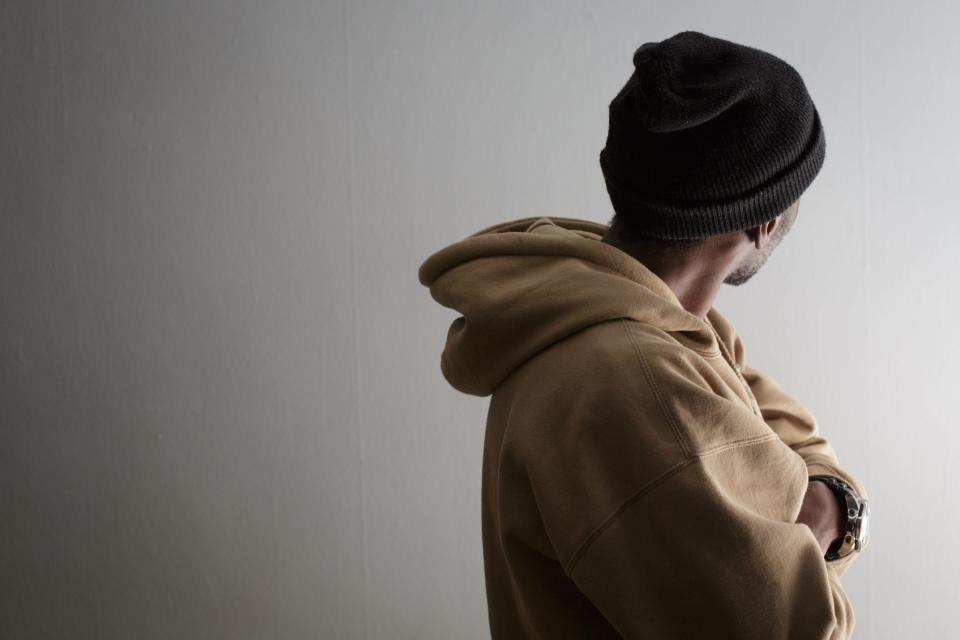
Rebekah Wolf, an attorney with the American Immigration Council, who previously managed a legal access program for a detention center in rural New Mexico, calls the modern U.S. detention system "a response to anti-Haitian animus" or "the fear that Black people would come here in boats."
To be sure, no person locked in the network of U.S. immigration detention centers — over 200 facilities run largely in the shadows by a mix of government and government-contracted private corporations — has it easy. To be imprisoned, frequently in poor conditions and sometimes for years is one of the poignant cruelties of the increasingly militarized immigration enforcement regime.
In the U.S., where more migrants are imprisoned than in any other country in the world, there are certain groups who face particular difficulties. Detained Indigenous people from Central America and elsewhere are often overlooked and left without access to proper interpretation or counsel. Transgender people are brutalized and frequently forced to live, sleep, and even bathe with people not corresponding to their gender. People from countries less represented in the detention system, such as those from South Asia or Eastern Europe, can face serious linguistic and cultural obstacles, as well as isolation. Muslims and Sikhs allege that they are often not offered religiously appropriate diets and are singled out on the basis of their religion.
Amid all the systematic and acute cruelties, the treatment of Black migrants from Africa, the Caribbean, and Central and South America in immigration detention, advocates say, reflects the longstanding societal racism in the United States, and particularly in its carceral system.
That bias came into sharp relief last September, when thousands of Haitians crossed the U.S.-Mexico border in Texas. Images of Border Patrol agents on horseback whipping and chasing down adults and children seeking asylum were roundly condemned. Critics held it up as a bald-faced example of anti-Black racism. This culminated in one of the largest mass expulsions from the United States in recent history: around 4,000 Haitians were deported from the country in just over one week.
The mistreatment of Haitian migrants not only renewed the public's attention to immigration enforcement, but demonstrated who is most negatively affected by the brutality of U.S. immigration enforcement.
Part of the reason that Black people suffer disproportionately in immigration detention is that their experience, and they themselves, are largely ignored. "They're not believed," Morris said. "We're not listening to Black immigrants."
Anti-Black racism "is so normalized, especially anti-Haitian sentiment, on behalf of career ICE officials," said Wolf. She said a high-ranking ICE detention center official in the state told her that, because Haitians "didn't know how to behave," they needed to be detained under more restrictive circumstances.
According to other statistics also compiled by RAICES, among the 10 nationalities with the most asylum decisions from 2012-2017, Haitians had the second-highest denial rate, at 87 percent, despite coming from an extremely politically unstable country beset by persistent violence. In the years before that period, Jamaicans had the highest asylum denial rate. According to the American Bar Association, Somalis also had one of the highest asylum denial rates, as well the highest rates of deportation over the same time period.
Between June 2018 and June 2020, the average bond paid by RAICES to get immigrants out of detention was $10,500. But bonds paid for Haitian immigrants averaged $16,700, or 54 percent higher than for other immigrants. Overall, Black immigrants from various countries pay significantly higher bond prices, the researchers found.
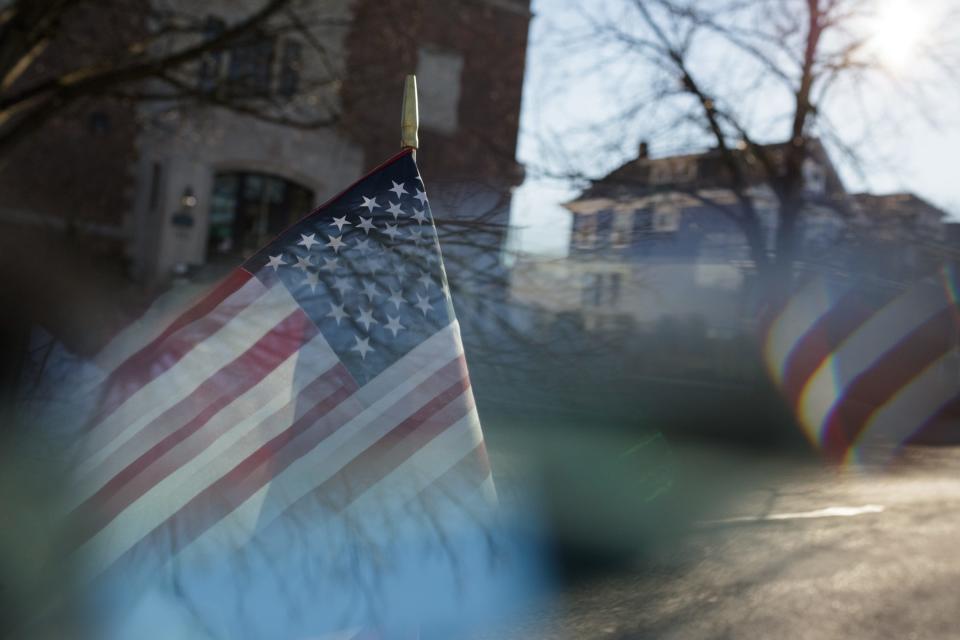
'They saw me like I was an animal from Africa'
In the summer of 2021, Brandon was released from detention. With Black people disproportionately being denied asylum, he knows the odds are stacked against him, but he is still fighting for his claim.
His next court hearing isn't for another 18 months. During the wait, he is living with a cousin and spending his time helping around the house. Despite repeated requests, he has yet to receive his work permit. Though he is free, for now, his memory of what happened to him still stings. At the same time, the anxiety of what may happen if he is deported, makes it hard to exercise and enjoy that freedom.
Back in Cameroon, the repression against anyone labeled a political dissident continues, with stories of denied and deported asylum seekers being imprisoned and tortured. Knowing that others like him were being detained, disappeared, or killed, he headed for refuge in the U.S. "My mind and my head was on one thing: my freedom," he said. That's not what he found. "I felt like they saw me like I was an animal from Africa."
On January 14, 2021, five officers in Winn Correctional Center in Louisiana, in an episode hauntingly similar to what happened to Brandon, attacked Cameroonian asylum seeker Acheleke Fuanya "without provocation," according to a complaint filed in U.S. federal court. The complaint says that "the officers surrounded Mr. Fuanya, tripped him to the ground, and kneeled on his neck." The government has not yet responded to the complaint, and ICE spokesperson Sarah Loicano declined to comment on pending litigation.
Fuanya said it felt like "they were trying to break every part of my body." As he pleaded for his life and struggled to breathe, the officers "continued to choke him until they grabbed his fingers and forcibly fingerprinted him," according to the complaint, allegedly trying to forcibly deport him. ICE has deported dozens of Cameroonian asylum seekers over the past year in similar ways, even resorting to using a medical restraining device called The Wrap, to threaten and punish asylum seekers during their long deportation flights.
Fuanya said the officers' assault against him was rooted in racism. "They way they would talk to you," he explained. "'You people are Black, you are from Africa,'" ICE officers would say to them, according to Fuanya, "like you were shit, like you were nothing."
Additional reporting from Sophia Diez-Zhang.
Read the original article on Business Insider

